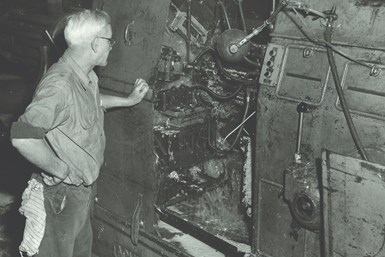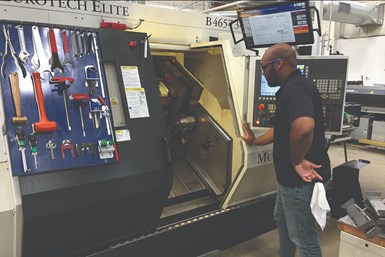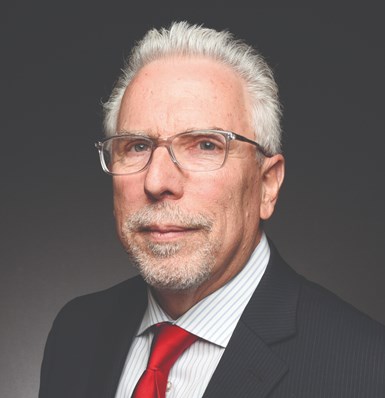Safe, Smart, Sustainable, Stable — Dispelling the Manufacturing Myths
Manufacturing has had a bad rap for a long time. The 3-Ds — Dark, Dirty, Dangerous — are almost a universal cultural belief wherever you go and no matter with whom you speak.
The 3-Ds — Dark, Dirty, Dangerous — are incredibly out of date, inaccurate and are being replaced in online conversations, at the very least, by the 4-Ss. I first heard of the 4-Ss when I was listening to Jason T. Ray’s Podcast, Safe, Smart, Sustainable and Stable. (Jason T. Ray is the president of one of PMPA’s affinity partners, Paperless Parts.) In that episode, Michael Tamasi, CEO at PMPA member AccuRounds, was the guest. When I called Michael Tamasi to get the credit right, he said that he had “borrowed” the phrase 4-Ss from Bill Berrien, CEO at PMPA manufacturing member Pindel Global Precision. So the challenger to Dark, Dirty and Dangerous is out and about online. Let’s take a look at the 4-Ss of Precision Machining.
Safe

Then: Dark, Dirty, Dangerous (Photo Credit: Photo from the personal collection of Cate Smith)
Our industry recognizes its responsibilities to protect the safety of our employees. Our companies value our performers and want to keep them safe. In addition, there is no advantage in losing their performers’ skills through on-the-job injury or illness. We continue to find ways to continuously improve our operations and safety, as well as the technologies we deploy and the training of our performers. Currently, our shops are leading the way with new LED lighting, improved ventilation and even climate control systems. Improved housekeeping is a natural consequence of our adoption of Lean and 5-S methodologies for organizing our operations. The new equipment we install has the latest in interlocks and CNC controllers. Cobots — collaborative robots that are safe for working around humans without guarding needed — are currently being adopted in many of our shops.

Now: Safe, Smart, Sustainable, Stable (Photo credit: Cox Manufacturing in San Antonio, Texas)
Safety has always been a priority in our industry — as we have consistently been an important supplier for many human safety-critical parts used in transportation (anti-lock brake parts, passenger restraint system components and airbag componentry), aerospace, medical equipment and devices (including implants such as bone screws), gas and electrical appliances, and a host of other important applications. Without our performers, these safety technologies would not exist and the world would be a less safe place. Safety is part of our operations, as well as an important driver of markets for the products of our talented performers.
Our first S — Safe — dispels the “Dark” and “Dangerous” Ds of the 3-D manufacturing myths.
Smart
Our industry is highly automated and computerized, and the technology requires “smarts” while reducing the manual aspects which come to the minds of many when thinking of our industry. In quality control alone, we routinely use optical non-contact measurement systems to characterize and validate multiple features on critical parts — in a single operation. Coordinate measuring machines — operated from a controller much like that of a video game — can use ruby and garnet probes to help determine complex geometric relationships between features and locations. Our performers become knowledgeable about the properties of different materials, tool materials and tool coatings based on chemistry and other treatments, and often use non-destructive testing to assure quality or conformance to requirements. Our formal quality systems support our smart processes to help us deliver parts at rates in the parts-per-million range.
The 3-Ds — Dark, Dirty, Dangerous — are incredibly out of date, inaccurate, and are being replaced in online conversations, at the very least, by the 4-Ss.
Our engineering and process experts create process routings to ensure the highest quality and least waste — helping us to provide the greatest value. Precision machining careers are smart — and in reach without a college degree. Our latest shop hourly wage survey showed typical operator and set up operator wages exceed Real Median Personal Income in the U.S. (MEPAINUSA672N) by over 20%!
Sustainable
Wages that exceed the median personal income are one aspect — and an important one — of being sustainable. But our industry and shops have always been a leader in recycling the materials in our operations. We not only recycle the chips and solids, but also isolate waste streams from packaging as well.
We are implementing Internet of Things technologies to help us to better understand energy usage in our shops, and every job that is produced is reviewed for both an efficiency and material yield-loss (mass balance) determination. These determinations help us to identify opportunities for improvement and minimize waste.
Stable
As a result of our performance in the areas of Safe, Smart, and Sustainable, our shops have created another S — we are Stable. The average length of membership in PMPA across all of our manufacturing member shops is 25 years. Of course, many of the companies are older than this. But durable goods must be made, industrial production goes on, even in bad times, and the precision machined components that our shop and talented performers manufacture are critical to that output. As a result, our smaller, family-owned, closely held precision machining companies find themselves in an enviable niche for the production of highly engineered, often human safety critical, necessary to the function components across many industries, markets and applications.
That stability translates to job security for our employees as well. Even during the Great Recession (December 2007-June 2009 in the U.S.) we had shops advertising for operators. During the COVID-19 crisis, while the broad economy was shut down, our shops were deemed essential manufacturing and several of our members took the lead in producing ventilator parts needed for health care to deal with the crisis.
That stability is earned by our safe, smart and sustainable performance. In compiling this year’s annual shop hourly wage survey, our participating shops made up just 2.2% industry’s establishments — yet produced shipments of over 5.4 % of the total industry’s sales. We are thriving. We continue to offer great opportunities for people to join our industry to join us on our journey to sustainable success.
Manufacturing — Safe, Smart, Sustainable, Stable
Manufacturing — in particular, precision machined products manufacturing — exemplifies the 4-Ss of Safety, Smart, Sustainability and Stability. If you, or someone that you know has had more than their share of volatility uncertainty, complexity and ambiguity in their life, perhaps you can show them that our industry is a far cry from the 3-D shops that their grandparents called manufacturing. We have great careers in safe shops, using smart technologies sustainably and proven stability for our talented performers.
Safe, Smart, Sustainable, Stable — this is how we describe the shops of the Precision Machined Products Association. What are YOU looking for?
Read More Articles from PMPA:
- Happy Workers Are Good Workers
- Craftsman Cribsheet No. 100: Built Up Edge — What It Is and What To Do
About the Author
Miles Free III
Miles Free III is the PMPA Director of Industry Affairs with over 40 years of experience in the areas of manufacturing, quality, and steelmaking. He helps answer “How?, “With what?” and “Really?” Miles’ blog is at pmpaspeakingofprecision.com; email – mfree@pmpa.org; website – pmpa.org
Related Content
Automation Breakthroughs Revolutionize Precision Machining for Complex Parts
Marubeni Citizen-Cincom delivers custom solutions to address some of the biggest challenges in precision machining from handling small parts, to robot integration and unique tooling needs.
Read MoreAutomation Idea for Halloween?
Maybe not. But, the candy-throwing robots at MetalQuest’s Nebraska facility do enable the contract machine shop to stand out at career fairs and similar events.
Read MoreUnattended Production Takes More Than the Most Capable CNC Machine
Process planning and reliable peripherals are key to successful lights-out manufacturing.
Read MoreTips for Troubleshooting and Repairing Chip Conveyors
A nonfunctioning chip conveyor can cause a high-production machine to be down for an extended period of time. Here is some troubleshooting advice if you’re having issues with your chip conveyors.
Read MoreRead Next
Do You Have Single Points of Failure?
Plans need to be in place before a catastrophic event occurs.
Read More5 Aspects of PMTS I Appreciate
The three-day edition of the 2025 Precision Machining Technology Show kicks off at the start of April. I’ll be there, and here are some reasons why.
Read MoreA Tooling Workshop Worth a Visit
Marubeni Citizen-Cincom’s tooling and accessory workshop offers a chance to learn more about ancillary devices that can boost machining efficiency and capability.
Read More






















